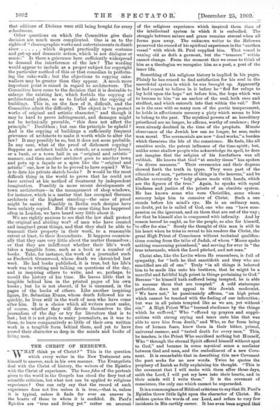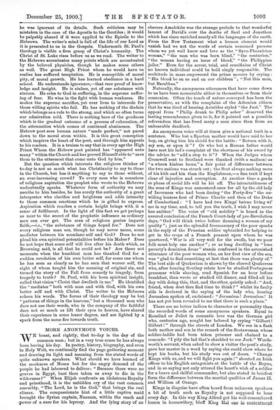TILE, CHRIST OF HEBREWS.
" WHAT think ye of Christ P " This is the question which every writer in the New Testament sets himself to answer, each in his own manner. The Evangelists deal with the Christ of history, the writers of the Epistles with the Christ of experience. The bona fides of the portrait given to the world in the Gospels has stood the fiery test of scientific criticism, but what test can be applied to religious experience ? One can only say that the record of such experience does not live unless it is true,—that is, unless it is typical, unless it finds for ever an answer in the hearts of those to whom it is confided. St. Paul's Epistles are "true and living yet" rather on account of the- religious experience which inspired them than of the intellectual system in which it is embodied. The struggle between nature and grace remains eternal when all forms pass away. The unknown writer to the Hebrews preserved the record of his spiritual experience in the "earthen vessel" with which St. Paul supplied him. That vessel is waxing old as loth a garment, but the " treasure " within cannot change. From the moment that we cease to think of him as a theologian we 'recognise him as a poet, a poet of the inner life.
Something of his religious history is implied in his pages. Plainly he has ceased to find satisfaction for his soul in the sacerdotal system in which he was brought up. Apparently he had ceased to believe in it before he " fled for refuge to lay hold upon the hope" set before him, the hope which was to become to him "as an anchor of the soul, both sure and stedfast, and which entereth into that within the veil." --But as is the case with so many men of the poetic temperament, he holds in affectionate memory a piety which seems to him to belong to the past. The mystical powers of an hereditary priesthood are no longer, he affirms, worthy of credence ; they were already doubted in the time of the prophets. Minute observance of the Jewish law can no longer, he sees, make men moral. The ceremonials are now "dead works," a burden which threatens the life of the conscience. He feels, like all sensitive souls, the potent influence of the time-spirit; but, unlike some shallow people who acknowledge its spell, he does not imagine that the religion of his forefathers was all rubbish. He knows that God "at sundry times" has spoken "in divers manners." Their ceremonies and their dogmas showed forth the truth in types. They were part of the education of man, "patterns of things in the heavens," and he alludes reverently to "holy places made with hands, which are the figures of the true." Again, he speaks with equal kindness and justice of the priests of an obsolete system. He has known some who were Christlike, some whose memory helps him to conceive of Christ. Such a one stands before his mind's eye. He is an ordinary man, no doubt, yet he is called of God, one who can "have com- passion on the ignorant, and on them that are out of the way ; for that he himself also is compassed with infirmity. And by reason hereof he ought, as for the people, so also for himself, to offer for sins." Surely the thought of this man is still in his heart when he tries to reveal to his readers the Christ, the great High Priest of Conscience without technical qualifica- tions coming from the tribe of Judah, of whom " Moses spake nothing concerning priesthood," and serving for ever in " the true tabernacle, which the Lord pitched, and not man."
Christ also, like the Levite whom He remembers, is full of sympathy, for " both he that sanctifieth and they who are sanctified are all of one." Truly " in all things it behoved him to be made like unto his brethren, that he might be a merciful and faithful high priest in things pertaining to God." Because "he himself hath suffered being tempted, he is able to succour them that are tempted." A cold statuesque perfection does not appeal to this Jewish modernist. " We have not," he passionately affirms, " an high priest which cannot be touched with the feeling of our infirmities; but was in all points tempted like as we are, yet without • sin." A High Priest Who " learned obedience by the things which he suffered," Who "offered up prayers and suppli- cations with strong crying and tears unto him that was able to save him from death," and Who, so far from being free of human fears, knew them in their bitter, primal, universal essence, and "tasted death for every man." This, he teaches, is the Priest Who sacrificed nothing but Himself, Who " through the eternal Spirit offered himself without spot to God," and became in some mystical sense a mediator between God and man, and the embodiment of a new Cove- nant. It is remarkable that in describing this new Covenant the poet seeks for no new words. Twice he quotes the prophecy of Isaiah as fully explaining his thought. " This is the covenant that I will make with them after those days, saith the Lord, I will put my laws into their hearts, and in their minds will I write them." It is the covenant of conscience, the only one which cannot be superseded.
It is a commonplace of Biblical criticism to say that St. Paul's Epistles throw little light upon the character of Christ. He seldom quotes the words of our Lord, and refers to very few incidents in His earthly career. It has even been argued that he was ignorant of its details. Such criticism may be mistaken in the case of the Apostle to the Gentiles ; it would be palpably absurd if it were applied to the Epistle to the Hebrews. The writer's mind is full of the life of our Lord as it is presented to us in the Gospels. Underneath St. Paul's theology is visible a firm grasp of Christ's humanity. The Christ of St. Luke rises before us as we read. The writer to the Hebrews accentuates many points which are accentuated by the beloved physician, though he makes some others as well. The great High Priest whom he would have us realise has suffered temptation. He is susceptible of moral pity, of moral growth. He has learned obedience in a hard school. He understands ignorance,—that rare proof of know- ledge and insight. He is sinless, yet of one substance with sinners. He cries to God in suffering, in the supreme suffer- ing of fear. He wins in the fight with human weakness. He makes the supreme sacrifice, yet ever lives to intercede for those willing spirits who fail. He has nothing of the disdain which belongs as a rule to the strong, and which so often turns our admiration cold. There is nothing here of the goodness which is the gradual outcome of a process of exhaustion, of the attenuation which comes of continued abstinence. The Hebrew poet sees human nature "made perfect," not pared down to the moral atom within. It is this great conception which inspires the heart of the poet, and through him appeals to his readers. It is a truism to say that in every age the High Priest Whom the Hebrew poet painted has "appeared unto many " within the Church and has proved Himself able to " save them to the uttermost that come unto God by him."
But the question which interests the religious thinker of to-day is not so much what has Christianity to say to those in the Church, but has it anything to say to those without, an ever-increasing crowd? To every man who is conscious of religious aspiration the prophet who wrote to the Hebrews undoubtedly speaks. Whatever form of authority we may ascribe to him besides, he has surely the authority of a great interpreter who clarifies and heightens and adds intensity to those common emotions which he is gifted to express. Aspiration which reaches a certain height brings with it a sense of fulfilment. In the light of this fact we get perhaps as near to the secret of the prophetic influence as ordinary men can ever get. The man of religious genius imparts faith,—i.e., "the substance of things hoped for." Does not every religious man see, though he may never name, some mediator between his mundane self and God? Does he not plead his own spiritual potentialities before his Maker ? Does he not hope that some self will live after his death which, as Browning said, is all that be could not be ? Are there not moments when the humblest man has thanked God for a sudden revelation of his own better self, for some one whom he has seen as clearly as he has seen that worser self, the sight of whom taught him the meaning of original sin, and turned the story of the Fall from comedy to tragedy, from tragedy to truth ? St. Paul, with his keen spiritual insight, called that vision " Christ that dwelleth in me." He identified the " mediator " both with man and with God, with his own better self and with Christ. The writer to the Hebrews echoes his words. The forms of their theology may be but " patterns of things in the heavens," but a thousand men who dare not use their words, who in the company of the faithful dare not so much as lift their eyes to heaven, have shared their experience in some lesser degree, and are lighted by a spark from the same fire towards truth.



































 Previous page
Previous page